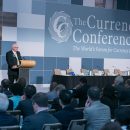prescription for a solid recovery – stress test the system
It takes some digging these days to find news in the media that puts a positive spin on our current economic situation. Perhaps “spin” isn’t the correct term here – what Mr. Geithner is doing (in my humble opinion) is giving us real hope. You don’t need to be an American to realize that if we are to get out of this bad economy, we will be lead by the current US administration working in concert with the other governments of the G20. It is always reassuring to hear that your partners and peers have a solid plan for success… keep you fingers crossed!
Geithner sees no new banking crisis
TOKYO (Reuters) – U.S. Treasury Secretary Timothy Geithner does not see a second wave of banking collapses and the government is ready to support capital-raising when needed, a Japanese newspaper said on Sunday.
In an interview with the Asahi Shimbun newspaper, Geithner was quoted as saying U.S. authorities were making sure there was steady funding and that banks were able to meet commitments.
“So in some ways what we’re saying is we’re going to backstop the amount of capital-raising that’s necessary,” he was quoted as saying in an English text of the interview.
“And again, a lot of that will come from the market, ultimately. But where it doesn’t we’ll make sure we provide it.”
In an attempt to assess banks’ capital needs, the U.S. government is testing how they would fare under more adverse economic conditions than are expected. The results are due at the end of April.
Once the “stress tests” are finalized and the capital needs are determined, banks will have six months to raise capital in the private market or could take an infusion of government funds.
Geithner was also quoted as saying the Group of Seven of rich nations and the Group of 20, which also includes emerging economies such as China and India, were “very complementary forums.”
Geithner will host both a G7 finance ministers meeting and a G20 ministerial session on April 24 in Washington.
He told the Asahi that China had played a role in stabilizing the global financial crisis, and added that Beijing was committed to a more flexible currency regime over time.
“China’s exchange rate appreciated quite substantially in real terms,” he was quoted as saying.
“China’s accumulation of foreign reserves has slowed and they are putting in place economic policies that will encourage domestic demand and growth.”
(Reporting by Chisa Fujioka; editing by Jeremy Laurence)









